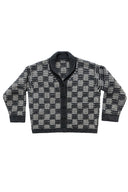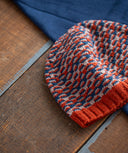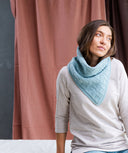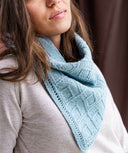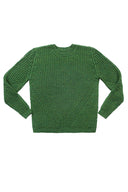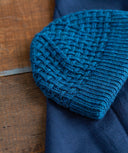Breed Specific Wool
It is no secret that we at Brooklyn Tweed love wool. We love its resilience, the warmth it provides, and the humbling feeling of holding in one’s hands a material so close to the earth and rich in tradition. However, what excites us most about wool are variety and potential — the opportunity to understand the magnificent animals from which it comes (including breeds’ individual strengths and weaknesses) and the potential to create something that honors the wool’s qualities as much as it honors its maker — something utilitarian yet individual, something to be loved, and something to stand the test of time.
This excitement and passion fuel our commitment to creating breed-specific yarns. But, all poetry aside, what does breed-specific actually mean and in what other ways is it significant to us and our fellow wool lovers?


Breed-specific wool yarns are yarns made up of fiber from a single breed (or known breeds) of sheep. And there are countless distinct sheep breeds all over the world to choose from! This ecological diversity can be attributed to the environmental conditions and changes that sheep have adapted to, as well as human intervention (e.g. breeding sheep to produce certain qualities that are more desirable).
Why produce yarn from just a single breed of sheep? Doing so allows the inherent properties and qualities of that breed’s fleece to take center stage and be utilized according to what its strengths are most well-suited for.
According to fellow wool-aficionado Clara Parkes’s The Knitter’s Book of Wool, most commercial wool yarn manufacturers, who produce yarns for both handknitting and ready-to-wear garments, focus on blending wool from different breeds of sheep into a homogenous fiber, with the aim of amplifying softness. “Coarser” fibers are not considered, while the unique quirks and characteristics of the individual wool varieties that do make it to the blend are dampened.
While this is one way to manufacture wool yarn, we take the breed-specific approach because we wish to highlight those unique quirks and characteristics with curious wonder and intention. Also, there is often the utilitarian sentiment that certain breeds of fleece may be more appropriate for certain kinds of projects — softness is indeed much appreciated for next-to-skin wear, but hardier wools can also have their place in garments that need to endure abrasion or the elements. Breed-specific yarns afford us makers a wonderful chance to experience many different kinds of knitted fabrics, each suited for an intended purpose.


For our breed-specific yarns, we source American-grown wool from breeds that run the gamut from finewool to mediumwool in order to provide options for creating a diverse range of fabrics, uses, and knitterly experience. Committing to breed-specific also allows us to source a consistent clip for all production cycles of our yarn lines, as well as to reinvest in domestic ranchers and ensure that a market exists for those ranchers and for their sheep, who produce the fleeces that we love. This, in turn, incentivizes the conservation of breeds and the safeguarding our planet’s biodiversity.
Columbia sheep raised in Wyoming provide the wool for Tones and Tones Light. One of the first sheep breeds developed in the United States, this large, friendly mediumwool breed began in 1912 in Laramie, Wyoming, as a cross between longwool Lincoln rams and finewool Rambouillet ewes. They produce thick white fleeces with robust substance, wonderful for warm and durable sweaters, accessories, and blankets.
The wool for Imbue Worsted and Imbue Sport comes from Merino sheep raised in Utah and Nevada. An ancient breed hailing back to 12th century Spain, the “King of Sheep" is renowned for supremely soft and dense finewool fleeces with lively spring, velvety luster, and superb vibrance of color when dyed. Multi-ply worsted-spun construction brings smoothness and durability to this wonderfully wearable wool.
Rambouillet sheep produce finewool as soft as their Merino first cousins’, trading Merino's legendary luster for an extra sprinkling of warmth and resilience. Loftier and bouncier than Merino, we prepare and spin it worsted-style for Re-Ply Rambouillet and Vale.
Purebred Targhee sheep from Montana and South Dakota lend us their distinctive fleeces for our Arbor and Arbor Lodge lines. This breed is a finewool, bearing the softness of its distant Merino ancestry, but with a durability enhanced by additional longwool genetics. It also has an elastic quality that, when combined with worsted spinning, produces plush yet sturdy fabrics suitable for next-to-skin wear.
The Targhee-Columbia breed combines the softness and elasticity of finewool Targhee with the robust substance and warmth of mediumwool Columbia. This versatile mingling of wearability and durability makes Targhee-Columbia suitable for next-to-skin wear, outerwear, or heirloom pieces for the home. We source this breed for Shelter, Loft, and Quarry; the woolen construction of these yarns further enhance the fleece’s lofty and warmth-trapping characteristics.
For those of you eager to learn more and embark on this breed-specific journey with us, we recommend Clara Parkes’s The Knitter’s Book of Wool and Deborah Robson and Carol Ekarius’s The Fleece and Fiber Sourcebook for further reading.
